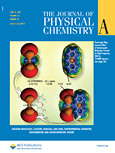
JOURNAL OF PHYSICAL CHEMISTRY A
Scope & Guideline
Unlocking the secrets of matter with rigorous inquiry.
Introduction
Aims and Scopes
- Molecular Dynamics and Reaction Mechanisms:
Research on the dynamics of molecular systems, including reaction pathways, energy transfer, and the kinetics of chemical reactions, particularly in gas and condensed phases. - Spectroscopy and Electronic Structure:
Studies utilizing various spectroscopic techniques to explore the electronic structure of molecules, their vibrational states, and photochemical properties. - Computational Chemistry and Theoretical Models:
Development and application of theoretical models, including quantum mechanics, density functional theory, and machine learning approaches to predict molecular behavior and properties. - Noncovalent Interactions and Supramolecular Chemistry:
Investigations into the nature and implications of noncovalent interactions in complex molecular systems, including their roles in biological processes and materials science. - Environmental and Atmospheric Chemistry:
Research addressing the chemical processes occurring in the atmosphere, including the fate of pollutants and the role of radical species in atmospheric reactions.
Trending and Emerging
- Machine Learning and AI in Chemistry:
The integration of machine learning and artificial intelligence in predicting molecular properties, reaction kinetics, and optimizing chemical processes is increasingly prevalent. - Nonadiabatic Dynamics and Quantum Effects:
Research focusing on nonadiabatic processes and quantum effects in chemical reactions is gaining traction, emphasizing the importance of quantum mechanics in understanding chemical behavior. - Sustainable Chemistry and Green Chemistry:
There is a growing trend towards research in sustainable and green chemistry, particularly in relation to energy storage, conversion processes, and environmentally friendly materials. - Spectroscopic Techniques for Complex Systems:
Advanced spectroscopic methods, including ultrafast and time-resolved techniques, are increasingly utilized to study complex molecular interactions and dynamics. - Radical Chemistry and Atmospheric Reactions:
The study of radical species and their role in atmospheric chemistry is becoming more prominent, reflecting the need to understand pollution and climate change dynamics.
Declining or Waning
- Traditional Organic Synthesis:
Research papers centered around conventional organic synthesis methods have decreased, possibly due to a shift toward more sustainable and innovative synthetic methodologies. - Static Models of Chemical Reactions:
The reliance on static models for understanding chemical reactions has waned as dynamic and time-resolved studies gain prominence in capturing real-time reaction mechanisms. - Classical Thermodynamics:
Classical approaches to thermodynamics are being overshadowed by more advanced computational techniques that provide deeper insights into molecular interactions and thermodynamic properties.
Similar Journals

Russian Journal of Physical Chemistry A
Unveiling Insights in Physical Chemistry ResearchWelcome to the Russian Journal of Physical Chemistry A, a prominent publication in the field of Physical and Theoretical Chemistry, published by MAIK NAUKA/INTERPERIODICA/SPRINGER. This journal, with ISSN 0036-0244 and E-ISSN 1531-863X, has been a vital platform for disseminating significant research findings since its inception in 1996. As a key contributor to academic discourse, it aims to provide high-quality articles that explore fundamental and applied aspects of physical chemistry, thereby enhancing understanding and innovation in the discipline. Although currently categorized as Q4 by Scopus (2023), the journal is positioned to evolve with the scholarly landscape, continually striving to improve its impact and relevance. With no open access options available, subscription to this journal is essential for those keen on enriching their knowledge and staying current with advancements in physical chemistry. Researchers, professionals, and students alike will find invaluable insights and robust discussions that can inspire their work and studies.

STRUCTURAL CHEMISTRY
Bridging Disciplines in Condensed Matter and ChemistrySTRUCTURAL CHEMISTRY is a premier journal published by SPRINGER/PLENUM PUBLISHERS, dedicated to advancing the study and understanding of the structural aspects of chemistry. With an ISSN of 1040-0400 and an E-ISSN of 1572-9001, this journal serves as a critical resource for researchers and professionals engaged in the fields of Condensed Matter Physics and Physical and Theoretical Chemistry. Since its inception in 1990, it has become an essential platform for disseminating high-quality research, featuring articles that explore innovative methodologies, experimental techniques, and theoretical frameworks. As evidenced by its Scopus rankings, including #192 in Condensed Matter Physics and #101 in Physical and Theoretical Chemistry, the journal occupies a respected position within the academic community, promoting interdisciplinary collaboration and insight. While it operates on a traditional subscription model, the journal continues to broaden its reach to foster knowledge exchange among scholars worldwide. With a commitment to excellence and relevance, STRUCTURAL CHEMISTRY remains a vital contributor to the scientific dialogue surrounding chemical structure and its myriad implications across various scientific disciplines.

PROGRESS IN REACTION KINETICS AND MECHANISM
Pioneering Research in Physical ChemistryProgress in Reaction Kinetics and Mechanism is a distinguished academic journal published by SAGE Publications Ltd, focusing on the intricate dynamics of reaction kinetics and mechanisms within the field of Physical and Theoretical Chemistry. With an ISSN of 1468-6783 and an E-ISSN of 1471-406X, this journal serves as a critical platform for researchers and practitioners seeking to explore and disseminate cutting-edge findings from 1999 to 2024. Although currently not categorized as Open Access, the journal maintains a competitive profile with a Q4 categorization in its field, showcasing its commitment to fostering scientific dialogue and inquiry. The journal ranks #140 out of 189 in its category, reflecting its integral role in advancing knowledge and understanding in chemistry. Scholars, professionals, and students who aim to stay at the forefront of research in reaction kinetics will find valuable insights and findings in this esteemed publication.
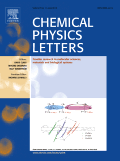
CHEMICAL PHYSICS LETTERS
Innovating Knowledge in Chemical Physics Since 1967CHEMICAL PHYSICS LETTERS, published by Elsevier, is a prestigious journal that has been at the forefront of advancing knowledge in the fields of physical and theoretical chemistry and physics since its inception in 1967. With an impressive impact factor reflective of its high-quality research output, this journal holds Q2 quartile rankings in both the Physical and Theoretical Chemistry and Physics and Astronomy categories for 2023. It is recognized as a key platform for disseminating groundbreaking findings, with Scopus rankings placing it within the top 76th and 66th percentiles in its respective categories. Researchers and professionals benefit from its insightful contributions and rigorous peer-review process, making it an essential resource for those engaged in cutting-edge chemical physics studies. Although the journal is not open access, it remains accessible through various institutional subscriptions, ensuring that a wide audience can explore its wealth of knowledge. Located in Amsterdam, Netherlands, the journal continues to drive innovation and collaboration across diverse scientific disciplines.
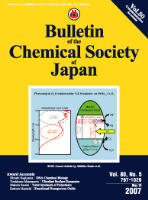
BULLETIN OF THE CHEMICAL SOCIETY OF JAPAN
Showcasing Excellence: A Nexus for Chemical ScholarshipBULLETIN OF THE CHEMICAL SOCIETY OF JAPAN, published by the esteemed Chemical Society of Japan, serves as a pivotal platform for the dissemination of cutting-edge research in the multifaceted field of chemistry. With an ISSN of 0009-2673 and an E-ISSN of 1348-0634, this journal has been integral in fostering the growth of chemical sciences globally since its inception in 1965. The journal holds an impressive Q2 ranking in the Chemistry (miscellaneous) category, indicating its relevance and influence within the academic community, as reflected by its Scopus rank of #104/408, placing it in the 74th percentile. Although it is not an open-access journal, its rich content, which spans a wide range of topics in general chemistry, remains highly valued by researchers, professionals, and students alike, affirming its crucial role in advancing both theoretical knowledge and practical applications in chemistry. As it converges towards 2024, the bulletin continues to uphold its commitment to excellence in scientific communication and research dissemination in Japan and beyond.

Physical Chemistry Research
Unveiling new methodologies in fluid flow and transfer processes.Physical Chemistry Research, published by the Iranian Chemical Society, is an esteemed academic journal dedicated to advancing knowledge within the fields of *Fluid Flow and Transfer Processes*, *Physical and Theoretical Chemistry*, and *Statistical and Nonlinear Physics*. Since its inception in 2013, the journal has established a crucial platform for researchers, professionals, and students to share innovative findings and methodologies, enhancing collaboration and knowledge dissemination in the physical chemistry community. With impactful contributions recognized in Quartile 3 and Quartile 4 classifications across various categories, the journal is positioned to cultivate emerging research trends as it continues to converge through 2024. Researchers can benefit from diverse perspectives on crucial phenomena in physical chemistry, as the journal is indexed in prominent databases, further increasing accessibility and visibility. The *open access* policy ensures that cutting-edge research remains available to a broad audience, promoting the growth of the discipline globally.

ACS Physical Chemistry Au
Advancing the frontiers of physical chemistry research.ACS Physical Chemistry Au, published by the American Chemical Society, is a pioneering open-access journal that provides a dynamic platform for researchers and professionals in the field of physical chemistry and its interdisciplinary connections. Since its inception in 2021, the journal has made significant strides in disseminating high-quality research, evidenced by its impressive standings in various categories, including Q1 rankings in Chemistry (miscellaneous), Computational Theory and Mathematics, and Physical and Theoretical Chemistry as of 2023. With a commitment to enhancing the visibility and accessibility of scholarly work, ACS Physical Chemistry Au offers a robust Open Access model, ensuring that groundbreaking research is freely available to a global audience. The journal serves as an essential resource for researchers, students, and practitioners seeking to advance knowledge in computational theory, physical chemistry, and their applied sciences. With an ISSN of N/A and an E-ISSN of 2694-2445, the journal is poised to make a lasting impact in the academic community.

DOKLADY PHYSICAL CHEMISTRY
Elevating Knowledge in Physical and Theoretical ChemistryDOKLADY PHYSICAL CHEMISTRY is a prominent peer-reviewed journal published by MAIK NAUKA/INTERPERIODICA/SPRINGER, focusing on advancements and research in the field of Physical and Theoretical Chemistry. With the ISSN 0012-5016 and E-ISSN 1608-3121, this journal serves as a vital platform for researchers and practitioners to disseminate their findings and insights from 1996 to the present. Despite its current Q4 ranking in the 2023 category of Physical and Theoretical Chemistry, the journal has shown significant potential for visibility and engagement within the academic community, ranking #149 out of 189 in its respective field according to Scopus metrics, highlighting its dedicated readership. While the journal is not open access, it remains an essential resource for those seeking in-depth research articles, reviews, and commentary within this dynamic discipline. As the field continues to evolve, DOKLADY PHYSICAL CHEMISTRY plays a crucial role in fostering scientific dialogue and collaboration among researchers, professionals, and students worldwide.
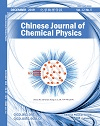
CHINESE JOURNAL OF CHEMICAL PHYSICS
Exploring the Dynamic Landscape of Chemical PhysicsChinese Journal of Chemical Physics, published by the Chinese Physical Society, serves as a pivotal platform for advancing the field of chemical physics, encompassing groundbreaking research and innovative methodologies since its inception in 2000. With an ISSN of 1674-0068 and E-ISSN of 2327-2244, the journal has established itself within the academic community, reflected in its 2023 classification as Q3 in Physical and Theoretical Chemistry and a Scopus rank of #142 out of 189, representing the 25th percentile in this competitive field. Although it does not currently operate as an open-access publication, its commitment to disseminating pivotal scientific research continues to attract scholars and professionals alike. The journal aims to bridge the gap between theoretical principles and practical applications in chemical physics, thereby fostering collaboration and innovation. By contributing significantly to the discourse in this dynamic domain, the Chinese Journal of Chemical Physics remains an essential resource for researchers, professionals, and students eager to stay abreast of contemporary developments.
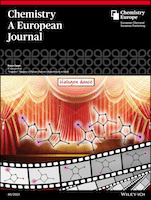
CHEMISTRY-A EUROPEAN JOURNAL
Connecting Researchers to the Heart of Chemical AdvancementsCHEMISTRY-A EUROPEAN JOURNAL is a premier academic journal published by WILEY-V C H VERLAG GMBH, specializing in the diverse fields of chemistry and catalysis, with a distinguished focus on organic chemistry. Since its inception in 1995, the journal has established itself as an authoritative resource for researchers and professionals, currently classified in Q1 in Chemistry (miscellaneous) and Organic Chemistry, reflecting its high-quality contributions to the scientific community. With an impressive impact factor and robust Scopus rankings—#33 in Organic Chemistry and #26 in Catalysis—this journal serves as a vital platform for disseminating innovative research findings and critical advancements in chemical sciences. Although not an open-access journal, it provides valuable access options for institutions, ensuring wide reach and engagement within the scientific community. As it converges into 2024, CHEMISTRY-A EUROPEAN JOURNAL remains a key resource for anyone dedicated to advancing the frontiers of chemistry research.